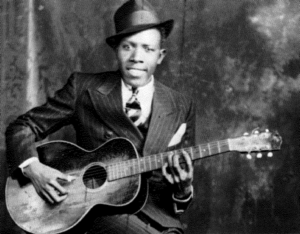 There is a lot of ambiguity when it comes to country blues: Delta blues, folk blues, acoustic blues; the name alone is problematic. To many this music is summed up as the delta blues, yet many of the great early country blues musicians did not actually hail from the Mississippi Delta. Kansas, Tennessee, Texas, Colorado, Louisiana are just a few of the areas that these players came from.
There is a lot of ambiguity when it comes to country blues: Delta blues, folk blues, acoustic blues; the name alone is problematic. To many this music is summed up as the delta blues, yet many of the great early country blues musicians did not actually hail from the Mississippi Delta. Kansas, Tennessee, Texas, Colorado, Louisiana are just a few of the areas that these players came from.
For most casual listeners the name of Robert Johnson is the epitome of the country blues, thanks in no small part to the efforts of Eric Clapton and others who espouse his genius. The reality is that there are many incredible musicians who create this genre of music.
There are many articles and books of scholarly work on the subject of the country blues; this article is not meant for those purposes. The focus of this article is to introduce the music of a few great musicians other than Robert Johnson to a modern audience.
Country blues comes in many forms, although it is usually epitomized by acoustic guitar and unique vocal stylists working mostly but not always within the 12 bar form. Another aspect of this style of music is the heartfelt nature. These artists were not imagining the perspectives of which they sing. These are emotive renderings of their lives in verse.
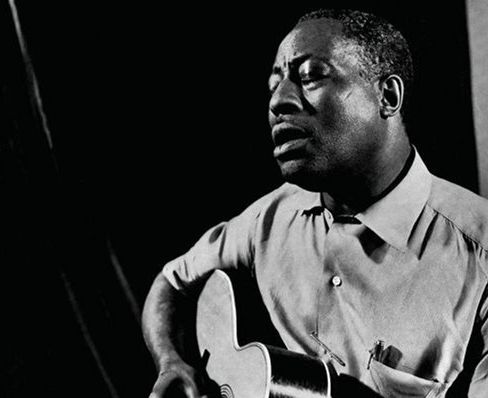 Big Bill Broonzy was a very successful musician by all accounts. His carrier began in the 1920s; he was able to navigate the fickle waters of changes in style, ultimately returning to and being celebrated for his original style well into the 1950s. Big Bill started with traditional guitar / vocal style and along the way include many of the elements that would become central to ragtime, swing and jazz. No matter how complex the music became, Big Bill Broonzy always kept the soul of the acoustic country blues central to his sound.
Big Bill Broonzy was a very successful musician by all accounts. His carrier began in the 1920s; he was able to navigate the fickle waters of changes in style, ultimately returning to and being celebrated for his original style well into the 1950s. Big Bill started with traditional guitar / vocal style and along the way include many of the elements that would become central to ragtime, swing and jazz. No matter how complex the music became, Big Bill Broonzy always kept the soul of the acoustic country blues central to his sound.
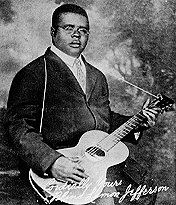 Blind Lemon Jefferson, the Father of the Texas Blues, was arguably one of the most popular blues musicians of the 1920s. Jefferson’s style is central to the idea of country blues: an absolutely unique singing voice and an extraordinary affinity for the guitar. The influence that Blind Lemon Jefferson had on many of his contemporaries as well as the modern blues musician cannot be overlooked. His recordings later influenced such legends as B.B King, T-Bone Walker, Lightnin’ Hopkins, Canned Heat, Son House and even Robert Johnson.
Blind Lemon Jefferson, the Father of the Texas Blues, was arguably one of the most popular blues musicians of the 1920s. Jefferson’s style is central to the idea of country blues: an absolutely unique singing voice and an extraordinary affinity for the guitar. The influence that Blind Lemon Jefferson had on many of his contemporaries as well as the modern blues musician cannot be overlooked. His recordings later influenced such legends as B.B King, T-Bone Walker, Lightnin’ Hopkins, Canned Heat, Son House and even Robert Johnson.
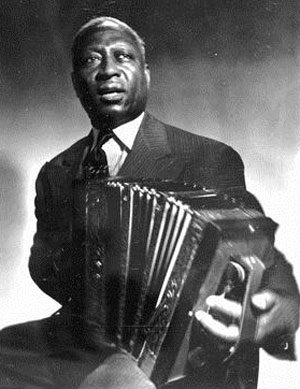 If there is an artist of this era that could be considered the consummate country blues artist, that would have to be Huddie Ledbetter, better know as Lead Belly. Armed with a massively powerful voice, a 12 string guitar (and at times piano, mandolin, concertina, accordion, harmonica and violin), a keen understanding of the popular music of the day and the ability to turn current events into songs that reach across the ages, Lead Belly defined the country blues. In his early days, Lead Belly was a successful local musician (and a multi-time prisoner in Texas and Louisiana) who eventually went on to national and international acclaim. He is personally responsible for songs that have been huge hits by many modern artists. Songs such as ‘The Midnight Special’, ‘Goodnight Irene’ and ‘Take This Hammer’ have been hits in folk, blues, rock and country genres.
If there is an artist of this era that could be considered the consummate country blues artist, that would have to be Huddie Ledbetter, better know as Lead Belly. Armed with a massively powerful voice, a 12 string guitar (and at times piano, mandolin, concertina, accordion, harmonica and violin), a keen understanding of the popular music of the day and the ability to turn current events into songs that reach across the ages, Lead Belly defined the country blues. In his early days, Lead Belly was a successful local musician (and a multi-time prisoner in Texas and Louisiana) who eventually went on to national and international acclaim. He is personally responsible for songs that have been huge hits by many modern artists. Songs such as ‘The Midnight Special’, ‘Goodnight Irene’ and ‘Take This Hammer’ have been hits in folk, blues, rock and country genres.
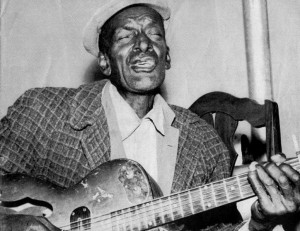 Sleepy John Estes was not just a guitarist, but an amazing singer who’s ‘crying’ style allowed him to reach through the music directly to the soul of the listener. Like other great artist of the genre, Estes sang the well known songs of his day while penning his own additions to the cannon of traditional blues.
Sleepy John Estes was not just a guitarist, but an amazing singer who’s ‘crying’ style allowed him to reach through the music directly to the soul of the listener. Like other great artist of the genre, Estes sang the well known songs of his day while penning his own additions to the cannon of traditional blues.
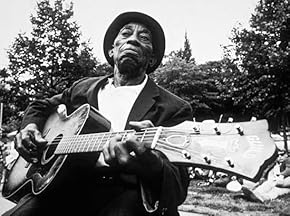 Mississippi John Hurt was a Mississippi sharecropper in the late 1920s who played for local dances and parties and ended up making a few commercially unsuccessful but extremely influential recordings before going back to farming. In the mid 1960s he was ‘rediscovered’ and joined in the American Folk Music Revival with fellow pre-war musicians. Hurt had a relaxed gentle style on the guitar matched by a warm grandfatherly timbre to his voice. He went on to make several recording for the Library of Congress and commercial recordings in the mid 1960s.
Mississippi John Hurt was a Mississippi sharecropper in the late 1920s who played for local dances and parties and ended up making a few commercially unsuccessful but extremely influential recordings before going back to farming. In the mid 1960s he was ‘rediscovered’ and joined in the American Folk Music Revival with fellow pre-war musicians. Hurt had a relaxed gentle style on the guitar matched by a warm grandfatherly timbre to his voice. He went on to make several recording for the Library of Congress and commercial recordings in the mid 1960s.
There are many great Country Blues artists out there, and since the music was so personal, most have their own unique approach to the genre. So if you can abide some very old recordings with a lot of surface noise, I highly recommend getting lost in the sound of the country blues for a while.
So glad you wrote this, JD: it made me pull out a Leadbelly CD that’s gathered dust for a while. Nice to revisit this seminal artist and learn about a few I wasn’t aware of.